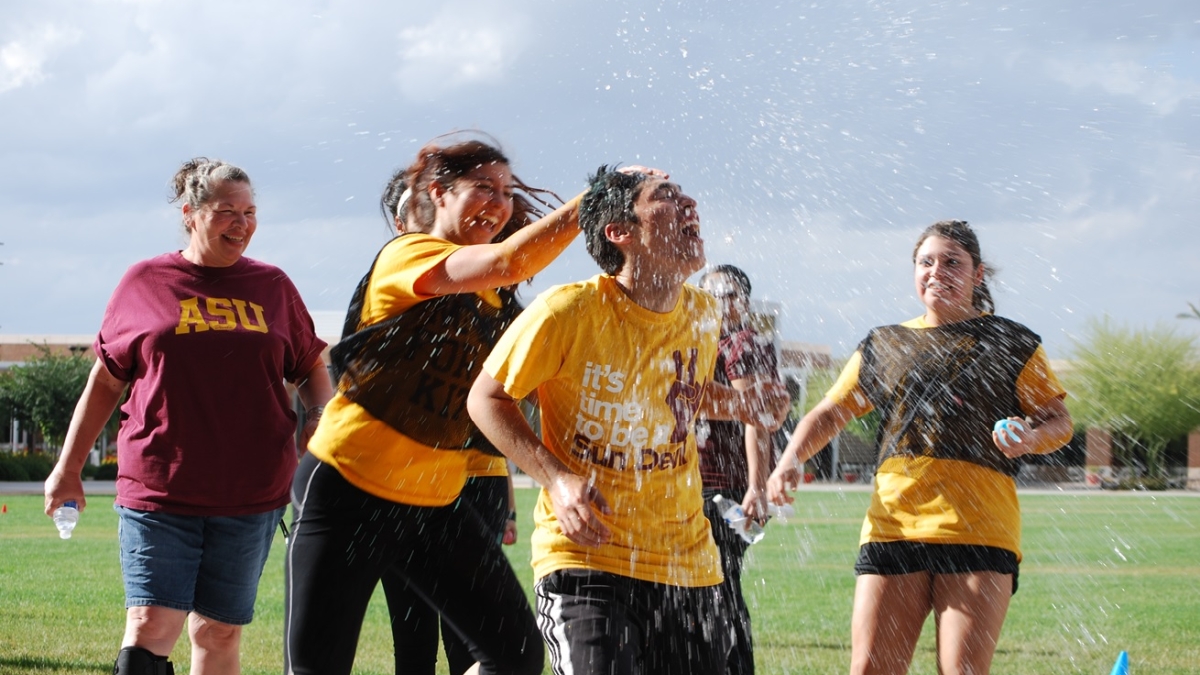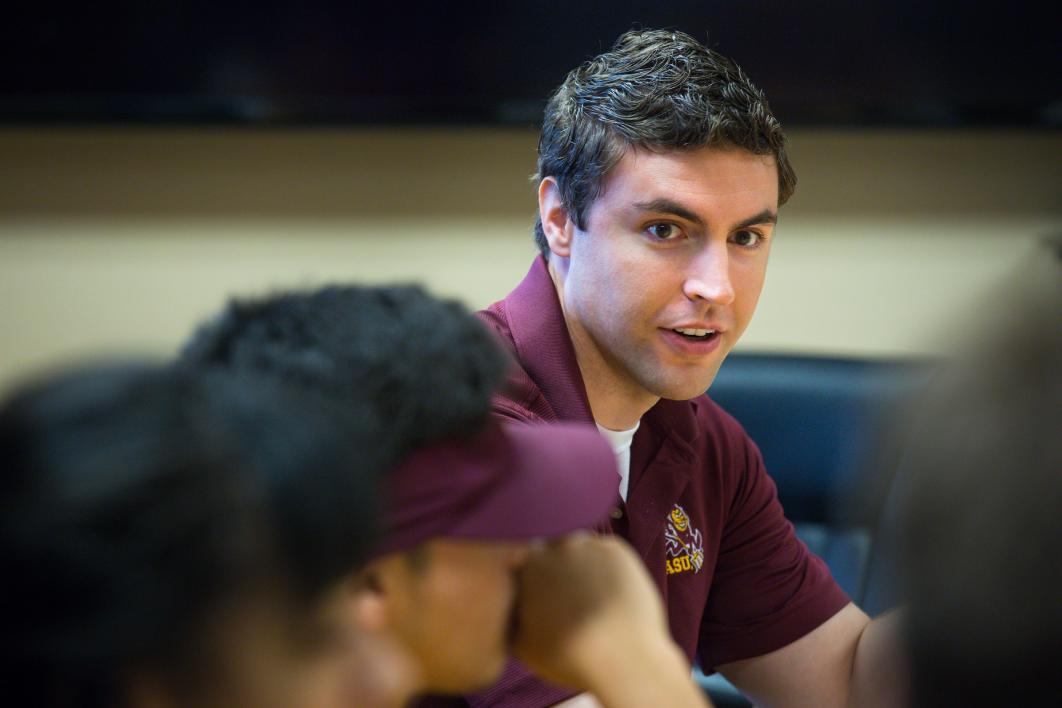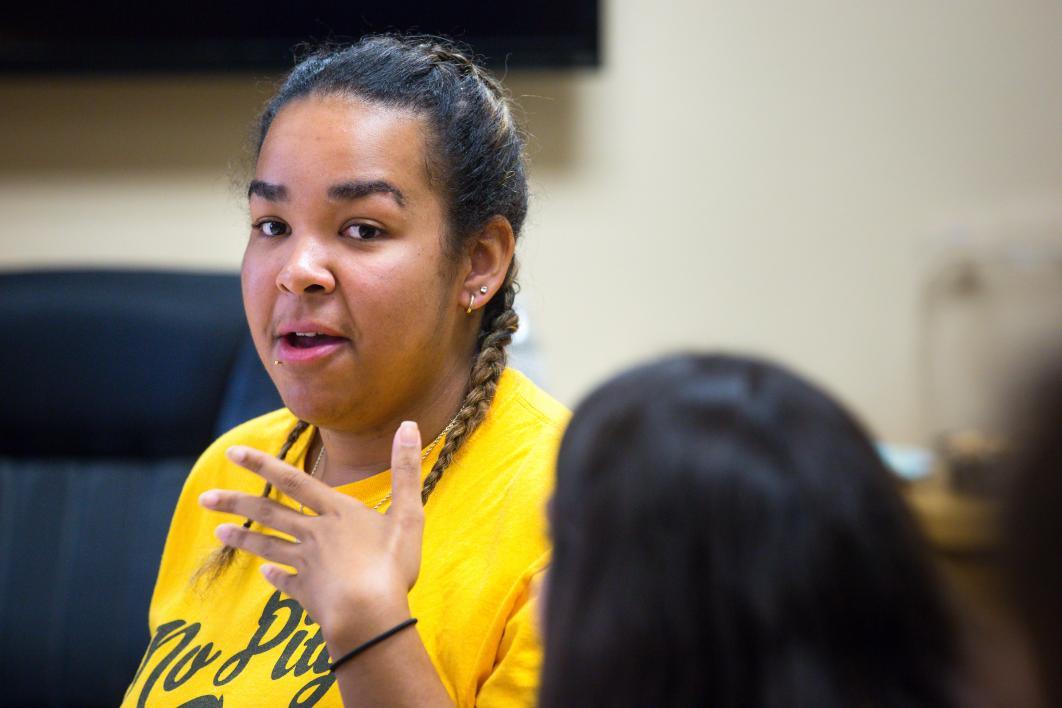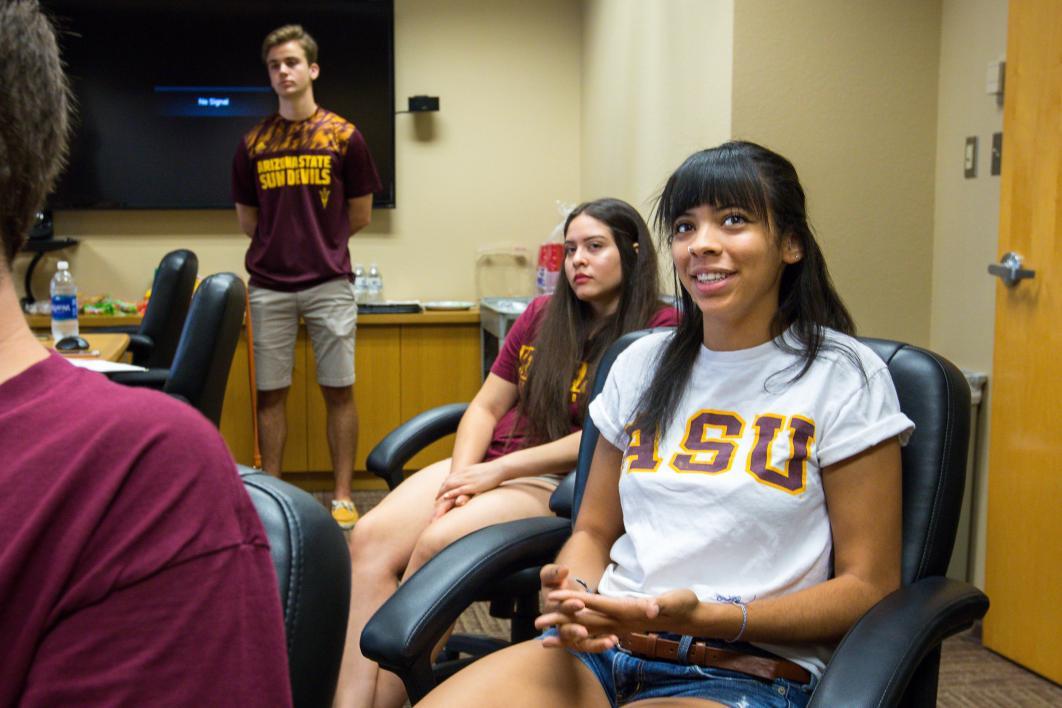ASU West Peer Mentor Program celebrates 10 years of student success

Two students in ASU T-shirts sit across from each other in an office on the West campus. One is hunkered down, arms crossed over his chest as the other leans in and gently asks for the second time whether anything is bothering him.
“Scene,” interjects Wilma Jackson from across the room, ending the mock one-on-one mentoring session. Jackson, an ethnicity, race and first nations junior, is lead peer mentor for the New College of Interdisciplinary Arts and Sciences' Peer Mentor Program, which celebrates its 10th anniversary with the commencement of the fall 2016 semester. Today she’s overseeing the training of new and returning peer mentors.
“That was good,” Jackson tells the student acting as mentor, but advises her not to push her mentee too hard. Sometimes you just have to be patient and let them open up on their own, she explains.
It’s something she has learned from experience — this is Jackson’s third year with the program. A native of Tucson, she struggled with homesickness as a freshman. Her peer mentor suggested she try participating in on-campus clubs and events to get adjusted, and it worked.
“When I got involved, I started feeling less homesick,” she said.
The best part is Jackson didn’t have to go looking for a mentor; they’re assigned to students before they even get to campus. Throughout the summer, they chat online and get to know each other so that by the time the school year starts, they’re already familiar.
During the fall semester, students are required to meet with their mentors three times in person and update them via email every week about their personal and academic progress. In the spring semester, the mentors pull back a bit to let the students spread their wings, only requiring them to update them via email — mentees who wish may meet in person with their mentor as many times as they like, though.
The program was founded by Anne Suzuki, assistant dean of enrollment services for ASU West, who has a background in first-year programming.
“The Peer Mentor Program at West came out of a need,” said Suzuki. “When we would do orientation with our freshmen classes, one thing they told us they wanted was more opportunities to get to know each other.”
When the program began, there were only three peer mentors, and they only met online. Now, there are nine peer mentors, each of whom is responsible for about 40 freshmen. And many of those first-year students go on to become peer mentors themselves.
“What’s amazing is we’ve created a pipeline for them,” said Suzuki. “They can start out as a front-desk worker for the program when they’re still a freshman, then their sophomore year become a peer mentor, then after that a peer mentor leader.
“And the program evolves with each cohort that leads, whatever they determine is the need at the time. … Last year was the first time we had a student teaching the ASU 101NEW 101, the New College version of ASU 101, is a required, one-credit course for new incoming freshmen. Offered in small classes capped at 19, it introduces students to the unique elements, culture, challenges and opportunities of their university. The course covers several core topics, including how to be successful at ASU, what it means to be a New College student, understanding interdisciplinarity, the significance of academic integrity, academic skill building, advising, service learning, the freshman first-year reading and discovering one's major and/or career. course. So we’re really trying give to them opportunities to become leaders and improve the program.”
Drew Koch, program coordinator for student success, oversees the peer mentors and leads training sessions before the beginning of the school year. He says the program is beneficial not just for the mentees, but for the mentors themselves.
“I like to see the peer mentors develop. Everyone always talks about what they do for the students, but nobody talks about what the program does for [the mentors],” he said. “From the interview process, to the training sessions and beyond, I watch them grow into leaders.”
Aside from the positive effects on students’ academic and professional development, the Peer Mentor Program lets them have fun. Regular events like the wildly popular matball and water balloon fights on Fletcher Lawn give students the chance to let loose amid the stress of their first year. The program also organizes study groups and opportunities for the students to have meet-and-greets with professors in a speed-dating sort of fashion, where they can ask them about anything, not just schoolwork.
“The main focus is to make sure they do well academically, but we also want to make sure they’re getting that fun, exciting experience that college is supposed to be,” said peer mentor Chase Pologa.
When Pologa was a freshman, his peer mentor had such an impact on him that he decided to become one himself.
“I’m a commuter student, so I was happy with my education but I wasn’t having a lot of other experiences,” he explained. “[My mentor] kind of pushed me out of my shell more.”
Jackson said she always advises her mentees to “keep an open mind.”
“Try new things; don’t be afraid to make mistakes,” she said. “For me, the program helped me to put myself out there, and now I’m doing something I never saw myself doing.”
Top photo: Peer mentor Victor Seca-Diaz gets nailed with a water balloon during a Peer Mentor event on the Sun Devil Fitness Complex lawn at ASU's West campus. Photo courtesy of Wilma Jackson


